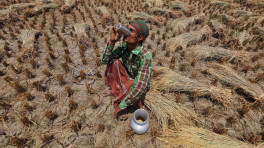Govt intervenes to keep prices in check ahead of polls
Govt to sell onion at Tk50, potato at Tk30 per kg from Tuesday

The government is deploying officials to potato cold storages nationwide as part of efforts to rein in prices of essential commodities ahead of the upcoming national elections.
Now cold storage owners will have to sell potatoes at Tk27 per kg, and deputy commissioners must ensure that tubers are retailed at Tk36.
Additionally, the Prime Minister's Office (PMO) instructed Bangladesh Bank Governor Abdur Rouf Talukder and Sonali Bank Managing Director Md Afzal Karim on Saturday to ensure an adequate supply of dollars for the import of potatoes, onions, lentils, eggs, oil, and sugar, according to Commerce Secretary Tapan Kanti Ghosh.
Besides, the government will sell subsidised potatoes, onions, lentils, and soybean oil to low-income individuals in the capital through 25-30 trucks. Each person will be able to purchase 2 kilograms of potatoes, onions and lentils, along with 2 litres of soybean oil.
A high-level meeting was held at the PMO on Saturday to discuss controlling daily necessity prices. At the meeting, DCs were instructed to deploy officers to all cold storages, which they have done since Sunday, said the commerce secretary.
At the same time, the PMO directed the managing director of Sonali Bank, the leading state-owned bank, to ensure an adequate supply of dollars for the import of products by the Trading Corporation of Bangladesh (TCB), which is responsible for subsidised sales of essential commodities.
The Bangladesh Bank governor has also been instructed to guarantee a sufficient supply of dollars for the import of consumer goods at the private level.
Finance Secretary Md Khairuzzaman Majumdar told The Business Standard that efforts are underway to reduce the inflation rate to 8% by next December through various measures.
"Despite the challenges, several plans have been implemented. The open market sales (OMS) of rice and flour at subsidised prices were temporarily halted due to a slight easing of the inflation rate, but it will be reintroduced," he added.
To control inflation, the central bank has ceased lending to the government through money printing, according to the finance secretary. While this is difficult for the finance ministry to accept, it is in the best interests of the country. There are several other initiatives underway to control inflation, including increased market monitoring.
The government's current plan to control inflation is to increase supply to the market by importing enough goods and to provide food products to poor people at subsidised prices under the social security framework, according to Finance Division officials.
The government expects food inflation to decline by the end of December if the supply of winter vegetables, including new potatoes and onions, and Aman paddy increases. Until then, the commerce and food ministries will continue open market sales to control the market for daily necessities and food products.
In the budget for the current financial year, the inflation target has been kept within 6.5%. Inflation rose to close to 10% last October, and food inflation was over 12.50%.
At an occasion last week, Abdur Rouf Talukder said the government's goal is to bring down point-to-point inflation to 8% by December and 6% by June. So the average over the 12 months of the current financial year will be around 7.5%.
However, the central bank governor blamed syndication and manipulation in the market for the high inflation. He emphasised strengthening market monitoring to control unscrupulous traders.
A finance ministry official said this issue was also discussed at the PMO meeting, but the government did not take strict action against traders before the election. However, the government may launch a crackdown against unscrupulous traders after the next election.
Commerce Secretary Tapan Kanti Ghosh expects a further decrease in egg and potato prices soon. He mentioned that 9,000 families in Dhaka will have the opportunity to purchase 2 kilograms each of onions, potatoes and lentils at Tk50, Tk30, and Tk60 per kilogramme, in that order, from open trucks. If enough sugar is imported, the government will also sell sugar at a subsidised price.
In addition, one crore TCB cardholders will also receive the prescribed products, including rice, once every month. This will have an impact on the market.
The commerce secretary said that officials have been deployed to sell potatoes from cold storages at Tk27 per kg. Monitoring will be strengthened to ensure that they are sold at Tk36 in the retail market.
He said the agriculture ministry on Saturday gave permission for the import of two lakh tonnes of potatoes, and 1,095 tonnes of potatoes have already been imported. Letters of credit have been opened for the import of more potatoes, and imports will continue until prices stabilise.
Tapan Kanti Ghosh said due to the import of 62,000 pieces of eggs, the market has already started to ease. Permission has been given to import 25 crore eggs, but imports were delayed due to legal complications. The process has now been simplified, and letters of credit have been opened for egg imports, so more eggs will be arriving soon.


 Keep updated, follow The Business Standard's Google news channel
Keep updated, follow The Business Standard's Google news channel















